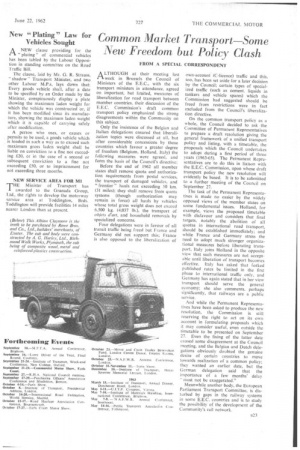Common Market Transport—Some New Freedom but Policy Clash
Page 29

If you've noticed an error in this article please click here to report it so we can fix it.
FROM A SPECIAL CORRESPONDENT LTHOUGH at their meeting last week in Brussels the Council of Ministers of the E.E.C., with the six transport ministers in attendance, agreed on important, hut limited, measures of liberalization for road transport between member countries, their discussion of the E.E.C. Commission's draft common transport policy emphasized the strong disagreements within the Community on this siabject.
Only the insistence of the Belgian and Italian delegations ensured that liberalization topics were discussed at all, but after considerable concessions by those countries which favour a greater degree of freedom (Belgium, Holland, Italy) the following measures were agreed, and form the basis of the Council's directive:
Before the end of 1962 all member states shall remove quota and authorization requirements from postal services, the transport of damaged vehicles, and " frontier " hauls not exceeding 50 km. (31 miles); they shall remove from quota systems (though authorization may remain in force) all hauls by vehicles whose total gross weight does not exceed 6,500 kg. (4,037 lb.), the transport of objets d'art, and household removals by specialized concerns.
Four delegations were in favour of all transit traffic being freed but France and Germany did not support this; France is also opposed to the liberalization of own-account (C-licence) traffic and this, too, has been set aside for a later decision by the Council; certain types of specialized traffic (such as cement, liquids in tankers and vehicle spares) which the Commission had suggested should be freed from restrictions were in fact excluded from the Council's liberalization directive.
On the common transport policy as a whole, the Council decided to ask .the Committee of Permanent Representatives to prepare a draft resolution giving the general framework of a unified transport policy and listing, with a timetable, the proposals which the Council undertakes to adopt during a first period of three years (1963-65). The Permanent Representatives are to do this in liaison with the E.E.C. Commission, upon whose draft transport policy the new resolution will evidently be based. It is to be submitted to a further meeting of the Council on September 27.
The task of the Permanent Representatives is made no easier by the widely opposed views of the member states on some fundamental issues. Holland, for example, views the proposed timetable with disfavour and considers that final targets, notably the abolition of all quotas in international road transport, should be established immediately; and while France and Germany stress the need to adopt much stronger organizational measures before liberating transport, Italy joins Holland in the opposite view that such measures are not acceptable until liberation of transport becomes effective. Italy has asked that forked published rates be limited in the first phase to international traffic only, and Germany has again stated that in her view transport should serve the general economy; she also comments, perhaps significantly, that railways are a public service.
And while the Permanent Representatives have been asked to produce the new resolution, the Commission is still reserving the right to act on its own account in formulating proposals which it may consider useful, even outside the timetable to be presented on September 27. Even the fixing of the latter date caused some disagreement at the Council meeting, and the Belgian and Dutch delegations obviously doubted the genuine desire of certain countries to move towards realization of a common policy; they wanted an earlier date, but the German delegation said that the importance of a few months' delay " must not be exaggerated."
Meanwhile another body, the European Parliament Transport Committee, is disturbed by gaps in the railway systems in some E.E.C. countries and is to study the possibility of the development of the Community's rail network.












































































































